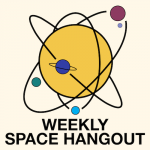Podcaster: Host : Fraser Cain; Guest: Dr. Andrey Vayner ,C.C. Petersen, Beth Johnson, Dr. Nicholas Castle

Title: Untying an Early “Cosmic Knot” with Dr. Andrey Vayner
Link: Cosmoquest: http://cosmoquest.org
Description:
Today’s story:
- JWST unprecedented insight into the most distant — and oldest — regions of our Universe
- Red or blood moon during eclipse
- Water on Earth
- Adapting plants to thrive in space
- Plants in spaaaaace!
- Psyche mission almost cancelled
- Pink Aurora
Host: Fraser Cain ( @fcain )
Special Guest:
Since its final commissioning and being placed in service, JWST has been delivering on its promise to provide unprecedented insight into the most distant — and oldest — regions of our Universe. Whether it’s providing a new view of our nearby neighbor Jupiter, or sussing out never-before-seen details of the iconic Eagle Nebula and its Pillars of Creation, let’s face it – the imagery so far has been nothing less than stunning! But more importantly, the data being collected by JWST’s onboard instrumentation are allowing scientists the ability to peer back in time to study the oldest cosmic structures while they are still in their infancy, potentially unlocking never-before understood processes that have led to the Universe as we know it today.
This week we are joined by Dr. Andrey Vayner, a member of a multinational team led by Dominika Wylezalek of Heidelberg University (Germany) that has been studying SDSS J165202.64+172852.3, an “extremely red” QUASAR that dates back to the earliest days of the Universe, some 11.5 billion years ago. Using data collected by NIRSpec, JWST’s near infrared spectrograph (https://webb.nasa.gov/content/observatory/instruments/nirspec.html), the team has been able to confirm the presence of not just one, but three, companion galaxies of the QUASAR that are actively in the process of merging.
Andrey is a Postdoctoral Fellow at Johns Hopkins University Physics and Astronomy Department. He obtained his Ph.D. from UC San Diego in 2019. He studies how galaxies and supermassive black holes evolve over cosmic time using advanced ground and space-based telescopes. His current focus is on early-release science observations with JWST, studying the most powerful active galactic nuclei that are heavily obscured by dust.
Want to learn more about this exciting research? Visit: https://hub.jhu.edu/2022/10/20/webb-quasar-galaxies/ ;https://esawebb.org/news/weic2217/ Want to take a deeper dive? You can find the team’s paper on Arxiv: https://arxiv.org/abs/2210.10074
To follow Andrey and learn more about his research, visit: https://astrovayner.com/ and you can also follow him on Twitter: @astrovayner
Regular Guests:
- C.C. Petersen ( http://thespacewriter.com/wp/ & @AstroUniverse & @SpaceWriter )
- Beth Johnson – SETI Institute ( @SETIInstitute & @planetarypan )
- Dr. Nick Castle ( @PlanetaryGeoDoc / https://wanderingsci.com/ )
Today’s sponsor: Big thanks to our Patreon supporters this month: Rob Leeson, David Bowes, Brett Duane, Benett Bolek, Mary Ann, Frank Frankovic, Michael Freedman, Kim Hay, Steven Emert, Frank Tippin, Rani Bush, Jako Danar, Joseph J. Biernat, Nik Whitehead, Michael W, Cherry Wood, Steve Nerlich, Steven Kluth, James K Wood, Katrina Ince, Phyllis Foster, Don Swartwout, Barbara Geier, Steven Jansen, Donald Immerwahr
Please consider sponsoring a day or two. Just click on the “Donate” button on the lower left side of this webpage, or contact us at signup@365daysofastronomy.org.
Or please visit our Patreon page: https://www.patreon.com/365DaysOfAstronomy
End of podcast:
365 Days of Astronomy
=====================
The 365 Days of Astronomy Podcast is produced by Planetary Science Institute. Audio post-production by Richard Drumm. Bandwidth donated by libsyn.com and wizzard media. You may reproduce and distribute this audio for non-commercial purposes.
This show is made possible thanks to the generous donations of people like you! Please consider supporting to our show on Patreon.com/365DaysofAstronomy and get access to bonus content.
After 10 years, the 365 Days of Astronomy podcast is poised to enter its second decade of sharing important milestone in space exploration and astronomy discoveries. Join us and share your story. Until tomorrow! Goodbye!

